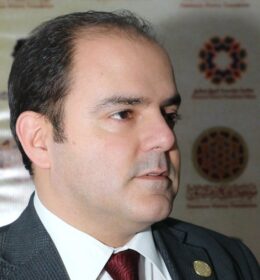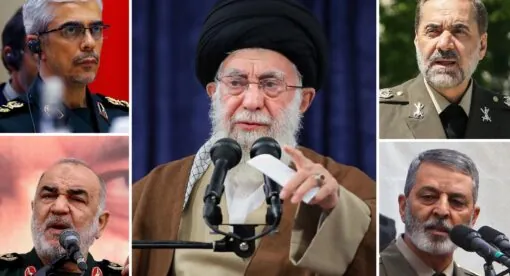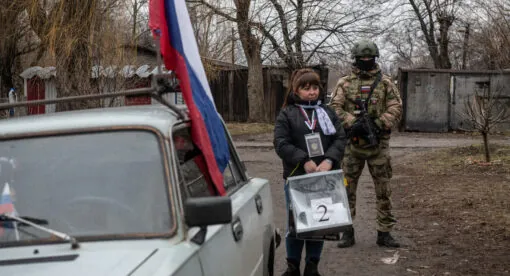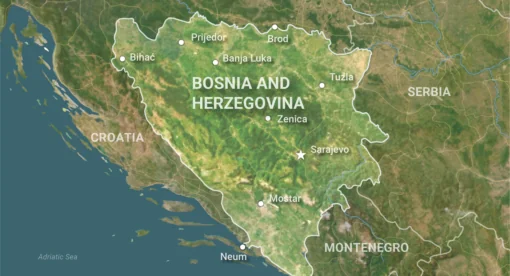In early September, gunfire erupted in Tareek Jdideh, an overwhelmingly Sunni neighborhood of Beirut, between supporters of the two al-Hariri brothers, Saad and Bahaa. It was an open secret in Lebanon that the sons of former Prime Minister Rafik al-Hariri were at opposite ends of the political spectrum. But never had they or any of their supporters clashed in public. The embarrassing incident was quickly shored up by the Hariris, but it was a clear indicator that all was not well within the powerful Sunni family of Lebanese politics.
It comes at a time where the Sunnis of Lebanon feel orphaned and in dire need of new leadership. They are over-muscled and outnumbered by the Shiites represented by two powerful groups Hezbollah and Amal. The Shiites exercise control over the state through their Christian ally, President Michel Aoun and Amal chief Nabih Berri being the speaker of parliament – with influence over more than half of the lawmakers. In addition to failing to restore Sunni prestige in Lebanon, the younger Hariri brother has prevented any Sunni figure from emerging, monopolizing the community’s affairs within his own Future Movement.
Prominent Beiruti Sunni families like the Salams, Bayhums, and Itanis, represented the vanguard of the anti-colonial movement and led the nation since the 1940s. They were all either sidelined, bought off, or forced to work underneath the umbrella of the Hariri family or go out of business. Many simply decided to retire from politics and take a backseat, unhappy with the fact that the Hariris, a family of humble origins hailing from Sidon, not Beirut, were now calling the shots in Beiruti politics. A new Sunni figure might be emerging today, however — not from the community’s traditional leadership, but rather another Hariri.
Bahaa and Saad al-Hariri had grown up in comfort in Saudi Arabia, away from the public eye until their father’s February 2005 assassination. They never lived in-country during the civil war, knew little about its internal dynamics, and even spoke with a Saudi accent. Born in 1967, Bahaa was a Boston University-educated businessman who worked for the family business, Saudi Oger, before setting up his own investment firm, Horizon Group. Saad, three years Bahaa’s junior, trained at Georgetown University.
After their father’s murder, they quietly divided the family empire, with Saad entering the political domain to eventually become prime minister and Bahaa focusing exclusively on the business sector. For 15 years, Bahaa seemed to sincerely harbor no political ambition and was rarely seen in Lebanon. Occasionally, unsubstantiated rumors would surface that he was unhappy with his brother’s political maneuvering, accusing him of wasting their father’s legacy and of being too soft on Hezbollah, which helped bring him to office twice, in 2009 and 2016.
The Rise of Bahaa
Bahaa’s apolitical attitude seemed to suddenly come to an end on Oct. 17, 2019, when the Lebanese Revolution broke out, bringing down his brother’s third cabinet. Bahaa quickly voiced support for the angry young demonstrators on the streets of Beirut who were demanding nothing less than an overhaul of the sectarian system on which the country has operated since 1943. They famously raised a slogan, “Kelon ya’ni Kelon,” meaning, “All of them, with no exceptions.” Bahaa trashed the entire political elite — including his brother — and took jabs at the militarized nature of Hezbollah, criticizing the Iran-backed party for becoming a state within a state. “We have always demanded confiscating of arms that are not part of the Lebanese state. We do not believe in arms,” he said.
Saad al-Hariri took the blame and stepped down from the premiership in January 2020. The top job subsequently went to Hassan Diab, an ally of Hezbollah and the Free Patriotic Movement. Saad remained on the margins for nine months until, on the first anniversary of the October Revolution, he presented himself for the Lebanese premiership, obtaining the swift nomination of 65 members of parliament and an official albeit unenthusiastic invitation to form a government from President Michel Aoun.
In early September members of Saad’s team learned that Saudi Arabia did not favor his comeback because Riyadh sought to “protect him” from the burden of leading a country in economic collapse. According to the uncredited story the Saudis wanted the affairs of state to be shouldered exclusively by Iran and its Lebanese allies. The kingdom wanted the pro-Iranian factions to be blamed for economic failure and security collapse, especially in light of the Aug 4 Beirut port explosion. It is unclear yet whether Saad’s Oct 9 change of heart was due to lifting of the Saudi veto — if there was ever one to start off with — or if it was inspired by the sudden rise of his brother challenging him for leadership of the Sunni community.
Saad has enjoyed close relations with Riyadh during the reigns of Kings Fahd (1982-2005) and Abdullah (2005-15). But the relationship has significantly changed since King Salman ascended to the throne in early 2015. Saad’s ties to the Saudis soured after what many claim was his forcible detention in Riyadh in November 2017. At the time, under pressure from Crown Prince Mohammad Bin Salman, he was forced to issue a half-hearted resignation, which was broadcast live on a Saudi channel, rather than his own Future TV or Lebanese state television.
Hezbollah Support for Saad
Hezbollah and Amal have been supporting Saad’s return to office, pleased by his mild response to the Special Tribunal for Lebanon’s verdict in the murder of his father, issued in August. Although a member of Hezbollah was blamed for the murder, Saad did nothing to demand his arrest, scoring points with the Shiite movement. He knew that his only chance of returning to power was to receive the blessing of Hezbollah. They set forth a series of conditions, which he agreed to fulfill.
One such condition was to issue a cabinet statement, once formally in-office, mentioning the word “resistance” and pledging to support Hezbollah’s right to resist Israel. A second one involved not imposing any additional taxes on the Lebanese, or to lift state subsidies on basic goods, which was a precondition for obtaining a $9-10 billion loan from the IMF. Talks with the IMF had started earlier this summer, after Lebanese officialdom gave up hope of unblocking an $11 billion loan from international donors, pledged in France back in 2018.
As a condition for obtaining that money, Lebanon had to carry out a series of far-reaching economic and political reforms. These included, among other things, clipping the wings of Hezbollah. Beirut was expected to confiscate its weapons and replace its forces with the Lebanese Army throughout the country’s south (in accordance with UNSCR 1701). That was something that neither Hariri nor his successor Hassan Diab were able—or willing—to do.
Other Hezbollah conditions were that it gets to name all Shiite ministers in the new government and that the Ministry of Finance goes to its allies in the Amal Movement. In addition, last month the Shiite movement added a new condition this week, laying claim to the Ministry of Public Works, which will play an important role in rebuilding the port of Beirut, and the entire city, when/if the reconstruction begins. Hariri said yes to all of the above, with the exception of the Ministry of Public Works, fearing that this might raise the ire of the international community and certainly infuriate the Americans.
Bending to all of Hezbollah’s demands is a direct result of Bahaa’s increased political visibility, which has thrown Saad off balance. It also means effectively destroying the initiative of French President Emmanuel Macron, which required that no portfolio is reserved exclusively for one sect/party. Having agreed to grant the Finance Ministry to the Amal Movement, Saad will find himself obliged to make additional concessions. As a result, Hezbollah could once again secure the Ministry of Health – a portfolio it has held since 2016.
Bahaa versus Saad
One week before Saad was officially named prime minister-designed, Bahaa made a surprise appearance on OTV, a satellite television channel owned by Aoun. The choice of OTV was surprising, given Bahaa’s public animosity to Hezbollah, who are allies of Aoun and the Free Patriotic Movement. OTV was not too enthusiastic about a Saad al-Hariri comeback, however, and was using Bahaa to challenge the prime minister-in-waiting. Saad had infuriated the Aounists by persistently refusing to name the president’s son-in-law, Gibran Basil, as minister in the new cabinet.
Basil had been foreign minister in Saad’s last government and has been often blamed for its downfall, accused of corruption, cronyism, and autocracy. In fact, much of the public anger of the 2019 Lebanese protests was targeted at him personally, explaining why Saad did not want him back onboard. Basil insisted that if Saad returned to office, then so would he since both were political equals, he argued, both heads of political parties with a strong following in Parliament. When it was clear that this was not going to happen, OTV brought Bahaa live on air with a byline that read, “Son of Rafik al-Hariri” — a title that until then had been exclusively held by his brother.
During his appearance, Bahaa said, “I love Saad but disagree with him, and we grew up in a home where disagreement was healthy. But I believe that the political system, which has been in power for the past 15 years, has failed and doesn’t deserve to stay.” This was the first public announcement that rivalry was brewing between the two brothers, coming one month after the Tareek Jdideh shooting. Bahaa called for a government of technocrats, where ministers were chosen for their professional merit rather than party affiliation. A technocratic-political one (like Saad was poised to form) would simply not work, he claimed. In theory, service-oriented posts would be reserved for technocrats, chosen for their professional merit rather than political affiliation, while other portfolios would be handled directly by the parties.
Bahaa revealed he was in negotiations with the Maronite Patriarch, who like him was opposed to Hezbollah having a military parallel to the state, adding that he was planning to announce a political program before the end of this year. His main points included dismantling the sectarian system, drafting a new election law, pursuing a policy of positive neutrality, and creating a Council of Lebanese Elders. In response, Saad also appeared on television, trying to downplay disagreement with his brother: “He is my older brother and if he enters the studio now, I will kiss his hand.”
Far from kissing his hand, however, Saad began a discrete program of dismantling his brother’s slowly emerging political powerbase. Doing the job on his behalf was Ahmad al-Hashmieh, head of the Beirut Association for Social Development (an affiliate of the Future Movement), who began wooing figures from Bahaa’s camp into that of Saad. The most prominent was Amir Abu Adileh, head of the Bekka Valley-based Political and Economic Forum, who had been attacked by Saad’s men in February and accused of stirring anti-Saad sentiment in the Lebanese south. In late October, he quietly resigned from Bahaa’s entourage and joined that of Saad.
Other defectors include Saad al-Sheikh and Fadi Yunis, two prominent activists in the October 17 Revolution. Both are based in Tareek Jdideh and are believed to have stirred the disturbances in the neighborhood on Sept. 8. On Oct. 25, a rumor circulated on social media networks, believed to be the doing of Saad’s team, that Bahaa had admitted defeat and resigned from political life altogether, surrendering to his brother. Bahaa quickly denied the statement, saying that he was still fighting for those who support him.
Bahaa continues to promote himself through a Facebook page called “Beirut City” and an online radio channel named “Sawt Beirut International.” Both are run by former employees of Saad who used to work at al-Mustaqbal newspaper and Future TV. The paper and the channel were two powerful outlets that had been established by Rafik al-Hariri in the 1990s. However, they were closed down within a period of months in 2019 due to lack of funds.
Saad’s Fourth Premiership
Saad is likely to succeed in forming a government, given that he enjoys the backing of all major political parties except the Free Patriotic Movement and the Lebanese Forces. He can still move on without them, however, since 40% of the Christian MPs currently support him. Whether his government succeeds is a totally different matter, however. He still has the monumental task of raising funds for the reconstruction of Beirut, where 250,000 homes were destroyed by the blast.
He also needs to come up with $6 billion annually to pay for government salaries, $110 million for wheat importation, $1 billion for medicine, and $3.7 billion for petroleum — money that Lebanon does not have. Unlocking international funding would require concessions that Saad cannot make. That would require broader reforms, which are extremely unlikely anytime soon. Lebanon’s once-promising banking sector has been in steady meltdown for one year, incurring losses estimated at over $83 billion.
Making the task all the more difficult is a noisy brother, who has emerged seemingly out of nowhere. Bahaa is challenging Saad in the very same constituency that he has ruled uncontested for 15 years. This rivalry between the two brothers will aggravate the weakness of Lebanon’s Sunnis. But more importantly, it gives more room to Hezbollah and Iran to play in the country.
Sami Moubayed is a Syrian analyst and historian. Moubayed is the author of “Under the Black Flag: At the Frontiers of the New Jihad” (IB Tauris, 2015). Follow him on Twitter at @smoubayed
The views expressed in this article are those of the author and not reflective of an official policy or position of the Newlines Institute.







